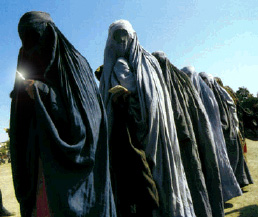Teaching the Uncivilized - the Afghan people and their enemy -

"When you're wounded and left,
On Afghanistan's plains,
And the women come out,
To cut up your remains,
Just roll on your rifle,
And blow out your brains,
And go to your Gawd,
Like a soldier."
Rudyard Kipling
(a souvenir of the Anglo-Afghan wars)

A MORAL CODE OF THE PATHAN PEOPLE
excerpt from EL PAÍS SEMANAL, Madrid (24/02/2002)
English version: Wolfgang Wiesner
The Pathan people are subject to an age-old moral code, the Pashtunwali,
a tribal law that had been applied by the Taliban in its ultimate
consequences. Now, in the aftermath of U.S. bombardment, the Pathans
are facing the challenge of governing Afghanistan.
...
The Pathan people never willingly accepted any borders, especially
when imposed by others. Today, it is believed that there are at least
20 million Pathans, on a territory extending within the borders drawn
by the British in the 1890s and comprising regions that count among
the most undeveloped and less governable of our planet. That region,
sometimes called Pashtunistan, had been estimated by the British as
the ultimate border of British India, their most important colony.
Over there was the kingdom of Afghanistan, a mosaic of ethnic groups,
since 1747 governed by Pathan kings. While expanding their empire
to the northwest of India, the British experienced various confrontations
with Pathan tribes without succeeding in subduing them. They
invaded Afghanistan on two occasions in 1839 and 1878. Both incursions
ended in a disaster. Finally, in 1893, the British understood that,
even if they could not win over that region, they could use it as a
very efficient buffer between British India and the Russian Empire.
...
In Peshawar, I met with Lateef Afrida, the leader of a Pathan tribe.
He told me that his father, two of his brothers and two of his cousins
died in tribal disputes. "Nowadays", he assured me, "if the Pathans
have a family quarrel, they are blowing each other with mines." Such
fightings make part of Pathan life, but they disappear when facing
an external threat. The Pathan people have a saying:
"I fight against my brother. My brother and me fight against our
cousins. We and our cousins fight against the enemy."
As I was frequently told, it is partly due to the common enemy that the
Pathan people supported the Taliban. They fought against the Soviet Union
when being occupied by them. They fought for power among themselves
and against the leaders of other ethnic groups when the Soviet
troups fled. When the Taliban came to power in the midth of the 1990s,
the Pathans recognized them as brothers belonging to the same tribe.
Now, when being attacked by the United States, the Pathans are ready
to back their defense. Due to Wazir Afridi, there are 50.000 men in
his district who declared themselves ready to fight. "The whole
region", he tells me, "is backing the Taliban, their Pathan and Muslim
brothers."
el texto original se encuentra aqui !
Excerpt from an interview with General Tommy R. Franks,
commander in chief of the U.S. Central Command, published
by TIME on march 4, 2002:
T: Do you think he (Osama Ben Laden) is dead or alive ?
Franks: I guess my personal inclination right now is that
he is alive because I have not seen someone deliver me
the DNA or deliver me whatever.
T: How many troops does the U.S. have in the region (i.e.
all Middle East) ?
Franks: ... Right now we have about 60.000. In Afghanistan
the number is about 5.000.
T: Are U.S. troops in more danger now than when they were
fighting an organized Taliban force ?
Franks: It's just as dangerous if not more dangerous today.
Yes, there is considerable danger inside Afghanistan to
all coalition forces.
T: As warlords fight for prominence, does the U.S. risk
being drawn into a civil war ?
Franks: ... On the day of (president) Karzai's inauguration
... one of the opposition group leaders, with whom we
had worked earlier in the fight, walked up to me from
across the room, hugged me and said, "Who do you want
me to fight now ?" That's instructive, because there's
a lot of that inside Afghanistan.
AL-JAZEERA TV, Qatar, reporting (01/05/02):
U.S. army wary of Afghan troups after threatening gesture
of Karzai government. ...... Recent news from Afghanistan

Für deutschsprachige Leser, hier ein Auszug aus den Erinnerungen des
Diplomaten Dr. Werner v. Hentig, der während des ersten Weltkriegs
Geheimverhandlungen mit dem Emir von Afghanistan führte.



